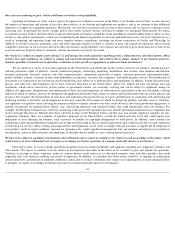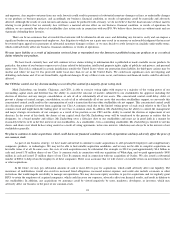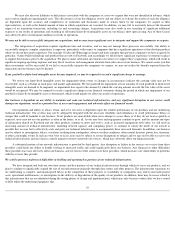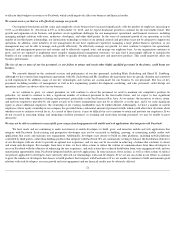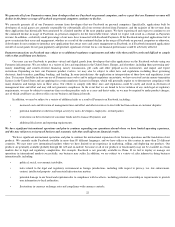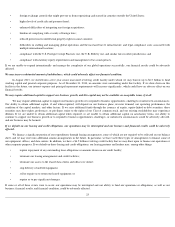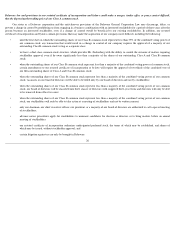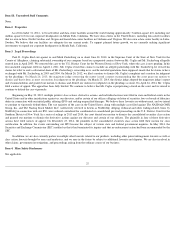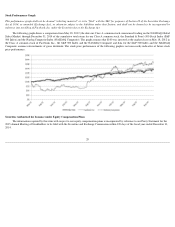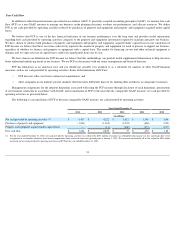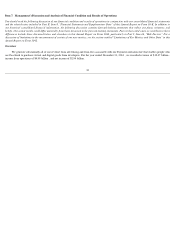Facebook 2014 Annual Report Download - page 25
Download and view the complete annual report
Please find page 25 of the 2014 Facebook annual report below. You can navigate through the pages in the report by either clicking on the pages listed below, or by using the keyword search tool below to find specific information within the annual report.
We generate all of our Payments revenue from developers that use Facebook on personal computers, and we expect that our Payments revenue will
decline in the future as usage of Facebook on personal computers continues to decline.
We currently generate all of our Payments revenue from developers that use Facebook on personal computers. Specifically, applications built by
developers of social games are currently responsible for substantially all of our revenue derived from Payments, and the majority of the revenue from
these applications has historically been generated by a limited number of the most popular games. We have experienced and expect to continue to see
the continued decline in usage of Facebook on personal computers for the foreseeable future, which we expect will result in a decline in Payments
revenue. In addition, a relatively small percentage of our users have transacted with Facebook Payments. If the Facebook-
integrated applications fail to
grow or maintain their users and engagement, whether as a result of the continued decline in the usage of Facebook on personal computers or otherwise,
if developers do not continue to introduce new applications that attract users and create engagement on Facebook, or if Facebook-
integrated applications
outside of social games do not gain popularity and generate significant revenue for us, our financial performance could be adversely affected.
Payment transactions on Facebook may subject us to additional regulatory requirements and other risks that could be costly and difficult to comply
with or that could harm our business.
Our users can use Facebook to purchase virtual and digital goods from developers that offer applications on the Facebook website using our
Payments infrastructure. We are subject to a variety of laws and regulations in the United States, Europe, and elsewhere, including those governing anti-
money laundering and counter-
terrorist financing, money transmission, gift cards and other prepaid access instruments, and import and export
restrictions. Depending on how our Payments product evolves, we may also be subject to other laws and regulations including those governing
electronic funds transfers, gambling, banking, and lending. In some jurisdictions, the application or interpretation of these laws and regulations is not
clear. To increase flexibility in how our use of Payments may evolve and to mitigate regulatory uncertainty, we have received certain money transmitter
licenses in the United States and are applying for certain regulatory licenses in Europe, which will generally require us to demonstrate compliance with
many domestic and foreign laws in these areas. Our efforts to comply with these laws and regulations could be costly and result in diversion of
management time and effort and may still not guarantee compliance. In the event that we are found to be in violation of any such legal or regulatory
requirements, we may be subject to monetary fines or other penalties such as a cease and desist order, or we may be required to make product changes,
any of which could have an adverse effect on our business and financial results.
In addition, we may be subject to a variety of additional risks as a result of Payments on Facebook, including:
We have significant international operations and plan to continue expanding our operations abroad where we have limited operating experience,
and this may subject us to increased business and economic risks that could affect our financial results.
We have significant international operations and plan to continue the international expansion of our business operations and the translation of our
products. We currently make Facebook available in more than 80 different languages, and we have offices or data centers in more than 25 different
countries. We may enter new international markets where we have limited or no experience in marketing, selling, and deploying our products. Our
products are generally available globally through the web and on mobile, but some or all of our products or functionality may not be available in certain
markets due to legal and regulatory complexities. For example, Facebook is not generally available in China. If we fail to deploy or manage our
operations in international markets successfully, our business may suffer. In addition, we are subject to a variety of risks inherent in doing business
internationally, including:
22
•
increased costs and diversion of management time and effort and other resources to deal with bad transactions or customer disputes;
•
potential fraudulent or otherwise illegal activity by users, developers, employees, or third parties;
•
restrictions on the investment of consumer funds used to transact Payments; and
•
additional disclosure and reporting requirements.
•
political, social, or economic instability;
•
risks related to the legal and regulatory environment in foreign jurisdictions, including with respect to privacy, tax, law enforcement,
content, intellectual property, and terrestrial infrastructure matters;
•
potential damage to our brand and reputation due to compliance with local laws, including potential censorship or requirements to provide
user information to local authorities;
•
fluctuations in currency exchange rates and compliance with currency controls;






